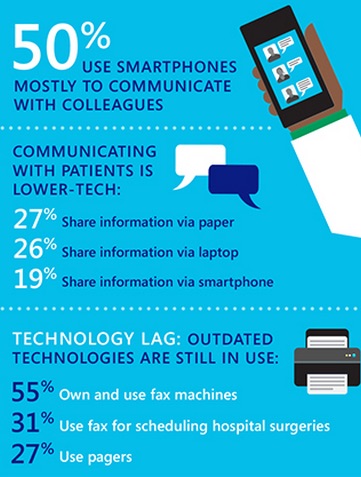 While most clinicians carry one or more mobile devices for a variety of use cases, it's still the case that no single screen is as popular as the desktop computer for physicians, according to a new survey released by Microsoft. The online survey of 402 U.S. physicians was conducted by YouGov.
While most clinicians carry one or more mobile devices for a variety of use cases, it's still the case that no single screen is as popular as the desktop computer for physicians, according to a new survey released by Microsoft. The online survey of 402 U.S. physicians was conducted by YouGov.
Fifty percent of physicians used smartphones, 49 percent used laptop computers, and 23 percent used tablets, according to the survey, but 56 percent still used a desktop computer. Additionally, 55 percent still use a fax machine and 27 percent still use pagers. Thirty-nine percent still use paper.
The desktop was still the primary choice for physicians for many information-sharing use cases: 46 percent used it to communicate with colleagues or specialists, 40 percent used it to schedule surgeries, 39 percent used it to communicate with pharmacists, and 35 percent used the desktop to contact patients.
Other ways to communicate with patients included paper (27 percent), a laptop (26 percent), and smartphones (19 percent). Fifty percent of doctors said they used a smartphone mostly to communicate with other colleagues.
Asked to list the benefits of using mobile technology, which Microsoft characterized as laptops, tablets, and smartphones, 61 percent of respondents said they made it easier to collaborate with other doctors. Fifty-eight percent said mobile devices provided easier access to patient data from anywhere, 50 percent said it made it easier to record information, and 41 percent reported greater productivity.
Being able to interface with patient data is important, because doctors said they record patient data in many different places. Fifty-seven percent said they record it in the room with patients, 24 percent record it outside the patient’s room, 7 percent record it in a breakroom or dining room, and 7 percent record it in the car.


















